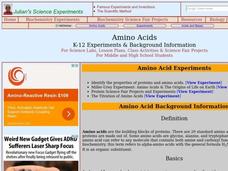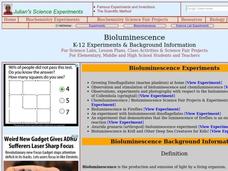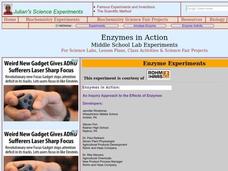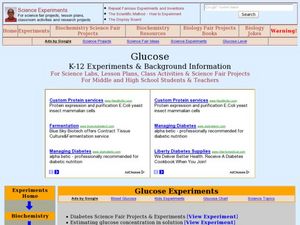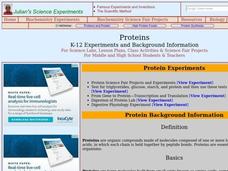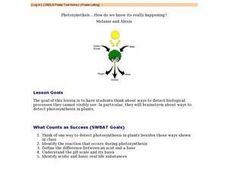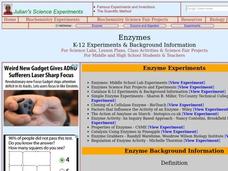Curated OER
Amino Acids
Learners explore what amino acids are, their history and how they are used in technology. In this protein lesson students identify the properties of proteins and amino acids.
Curated OER
Thin Layer Chromatography (TLC) Separation of Plant Pigments - Chlorophyll, Carotene
Students use TLC separations to identify various substances. For this chlorophyll lesson students separate pigments found in different plants.
Curated OER
Thin Layer Chromatography (TLC)
Students study flavinoids and how they exist in the plant kingdom. In this pigment lesson students complete a lab activity to see how flavinoids move in substances then record their observations.
Curated OER
The Role of Amyloid in Alzheimer's Disease
Learners explore amyloid proteins through a series of experiments. In this biology lesson plan, students explain the causes of Alzheimer's disease. They identify common symptoms related to this condition.
Curated OER
Bioluminescence
Students differentiate chemiluminescence from bioluminescence. In this biology instructional activity, students explain how fireflies and other animals emit light. They discuss the applications of engineered bioluminescence.
Curated OER
Antibodies
Students conduct a series of exploration activity on how vaccines and antibodies work. In this biology lesson, students test how antigens and antibodies work in the body. They discuss the benefits of vaccines in promoting immune responses.
Curated OER
Catalase and Catalysis
Students explore enzyme catalysis through a series of experiments. For this chemistry lesson, students determine the factors affecting catalysis. They explain the different uses of this process.
Curated OER
Gel Electrophoresis
High schoolers conduct a variety of experiments to explore gel electrophoresis. For this biology lesson, explain how this process separate DNA and RNA. They discuss the practical applications of this method.
Curated OER
Enzymes in Action
Students explore how enzymes are important in the chemical reactions of all living things. For this enzymes and catalysts lesson students complete an activity to see how enzymes change living things.
Curated OER
Glucose
Students conduct various experiments on glucose. In this biology lesson, students differentiate the process of diffusion and osmosis. They test different foods for the presence of glucose and starch.
Curated OER
Polymerase Chain Reaction (PCR)
Students explore how PCR works through various activities. In this biology lesson, students explain how PCR generate copies of DNA. They simulate the process using an online interactive website.
Curated OER
Proteins
Students conduct a variety of experiments to explore protein. In this biology lesson, students solve a mystery by testing for the presence of glucose, protein starch and triglycerides. They explain how DNA transcription and translation...
Curated OER
Tobacco Smoking and Lung Cancer
Students explore tobacco smoking and the impact it has on society. In this health lesson students complete several experiments on smoking and lung cancer.
Curated OER
Characterization of the Bioluminescence (Lux+) Gene E. coli
Students grow E. coli strain HB101, which contains the plasmid pUCD607 with the bioluminescence (Lux+) gene. The plasmid containing the Lux+ gene is isolated from the E. coli, then characterized by restriction analysis.
Curated OER
Testing for Life’s Molecules
Want to hear a joke about sodium? Na. Young scientists test various materials to identify if they include protein, starch, and glucose by using the Biuret test, iodine starch test, and Benedict's test respectively. After practicing with...
National Center for Case Study Teaching in Science
Breast Cancer Risk
How does one determine whether or not someone is at risk for breast cancer? Find out through a comprehensive case study involving two readings and a group activity in which learners assess four women's potential for acquiring the...
Curated OER
Dinosaur and DNA Days
Biology stars extract DNA samples from beef thymus and then examine its properties. They use enzymes to digest the DNA samples, and then use electrophoresis to separate fragments. Finally, they discuss methods and principles of...
Curated OER
Photosynethsis....How do we know it's really happening? - Biology Teaching Thesis
High schoolers think of one way to detect photosynthesis in plants besides those ways shown in class. They identify the reaction that occurs during photosynthesis. Students define the difference between an acid and a base. They identify...
Curated OER
Non-covalent Interactions of Molecules
Young scholars participate in a class discussion about non-covalent interactions of molecules forming and shaping the macromolecules essential in biology. Handout provided is used as an outline for discussion.
Curated OER
Amylase
Students examine what amylase is and its history. In this digestive instructional activity students study the effect amylase has on starch and how temperature affects the rate of activity.
Curated OER
Antigens
Students examine antigens including ones found in humans. In this immune lesson students complete several experiments in relation to antigens and antibodies.
Curated OER
Chromosomes
Students explore genetics, chromosomes and DNA. In this genetics lesson students design a chromosome and identify a family tree through genetics.
Curated OER
DNA
Students explore the basics of DNA and its history. In this DNA lesson students extract DNA from fruits and understand how it is used in forensics.
Curated OER
Enzymes
Students explore enzymes and what can inhibit and act as a catalyst for them. In this enzymes lesson students complete experiments on enzyme properties.
Other popular searches
- Biochemistry Biology
- Biochemistry Carbohydrates
- Biochemistry Projects
- Biochemistry Study Material
- Biochemistry Activity Notes
- Introduction to Biochemistry
- Biochemistry Lesson Plans
- Biochemistry 9 12
- Biochemistry Plant
- Biochemistry Vocabulary
- Biochemistry Atoms
- Biochemistry Amino Acids


